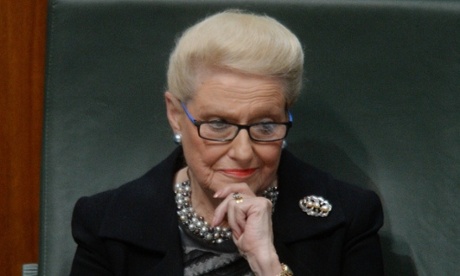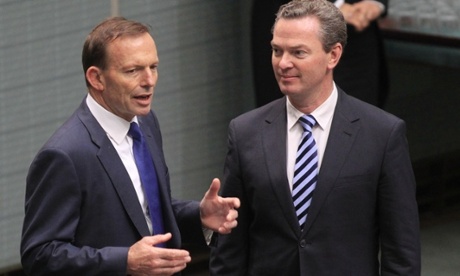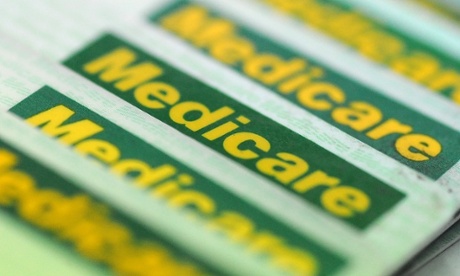 Photo: John Howard took four terms as PM to ruin his reputation for honesty. Tony Abbott has done it in less than one full year. (AAP: Alan Porritt)
Photo: John Howard took four terms as PM to ruin his reputation for honesty. Tony Abbott has done it in less than one full year. (AAP: Alan Porritt)
John Howard had a reputation for being a "safe pair of hands" before he started trashing his promises. Tony Abbott didn't have that clout, so the backlash was swift, writes Tim Dunlop.
Tony Abbott remains in office but he is no longer in power. I don't think I'm exaggerating in saying that.
Political power in a democracy derives from the consent of the governed - as the political scientists say - and voters only give their consent when they trust. I think it is fair to say that most people no longer trust Abbott.
Politicians can obviously survive broken promises, but Abbott's first budget has taken us into new territory.
A comparison with his old boss, John Howard, is instructive.
Howard came to power in 1996 with a high level of public trust. He had been around so long that most people thought they understood his motivations and his world view.
So even when he went all "core" and "non-core" on his election promises, people wore it because, to a large extent, they accepted his reasoning.
In those days it was pretty common to hear that Howard was "a safe pair of hands". So even though voters weren't thrilled with the broken promises, they still trusted him to do the right thing by the country. Even to those who didn't trust him, his authority was clear.
It took a few more terms of government for Howard to completely throw away that goodwill.
A report prepared inside his own party in 2001 branded him as "mean and tricky" and out of touch. Then came the "children overboard" fiasco and significantly, the deceptions around Saddam's weapons of mass destruction. To top it all off, there was WorkChoices.
By 2007, John Howard had so thoroughly trashed his brand that he not only lost government, he lost his own seat, becoming only the second prime minister in history to suffer that ignominy.
Losing the election had a lot to do with the rise of Kevin Rudd. Losing his seat was entirely down to Howard himself.
Yes, as the saying has it, all political careers end in failure, but at least Howard had success along the way.
Abbott, on the other hand, came to office without any of Howard's trust ballast. The media might have curled up in his lap after christening him the greatest opposition leader ever, but he was never popular.
Like Howard, he was a known quantity, but not in a good way.
Abbott's victory in 2013 was a classic case of the truism that says governments lose elections, oppositions don't win them.
All through the Howard years, Abbott was never considered a leadership contender (not even remotely), and even after they lost power in 2007, Abbott's elevation was more or less accidental. It only came after the party had burned through two other leaders (three if you count the fact that Peter Costello, the heir apparent, spat the dummy and ran back to Toorak).
Abbott's victory in 2013 was a classic case of the truism that says governments lose elections, oppositions don't win them.
What's more, I think it is fair to say that it was Abbott's poor standing with the electorate that caused him to overcompensate with his promises. On some basic level, he understood that people didn't trust him and so he went into absolute overdrive to assure people that he was, at the very least, preferable to Julia Gillard whom sections of the media had tirelessly constructed as "Juliar".
All the hand-on-heart promises and reassurances he gave as opposition leader went well beyond the normal level of campaigning and entered into a sort of pathological zone of desperation.
This is why the broken promises are currently doing him so much damage.
It is not because people are shocked that a politician has gone back on his word, but because in going back on his word, Abbott has reinforced the negative view that people had of him anyway, the one he was compensating for in making the promises in the first place.
Still, there is more to it than broken promises. There is the fact that the specifics of what he has done are worse than most people ever dared imagine.
He has delivered a budget that not only breaks faith with his pre-election promises - in a way that is breathtaking for even the most hardened of political cynics - but that breaks faith with what I call the founding myth of Australian society, a commitment to egalitarianism and the fair go.
Back in March 2013, I wrote a piece that suggested that the Australian consensus on a fair go may no longer be shared by a significant section of the political class, and I worried about what an incoming Abbott Government would do.
One of the reader comments on that story said this:
A poor article ... A commitment to a fair go and egalitarianism will continue to be a part of Australian society. To suggest otherwise is hysterical.
I'm sure many people felt the same way. It was inconceivable that any government would attack the pillars of Australia's self-understanding. But that's exactly what this budget does.
As any number of expert analysts have shown (see this, for example), the burden of this Government's restructuring falls on those at the lower end of the income and wealth scales.
Budget measures are, by and large, designed not just to hit lower and middle-income families, but specifically to insulate the rich from much of the pain. And as Ross Gittins puts it:
Don't think just because you voted for the Coalition Hockey is looking after you.
Howard took four full terms as prime minister to completely ruin his reputation for honesty. Abbott has done it in less than one full year. How could anyone be so clumsy?
The answer lies in authority.
Both inside and outside the party, Abbott draws on very shallow reservoirs of support. This in turn is related to the fact that the Coalition itself no longer connects with a significant "base".
This is why our politics has become more and more an exercise in media management than in policy commitment. And that situation is made worse by the fact that the media itself has fractured beyond repair and thus mirrors the political sphere in its lack of authority.
Such a situation does not lend itself to long-term planning. It lends itself to short-term shock-and-awe tactics. When you sense the precariousness of your grip on power, you want to shake things up as quickly as possible, to try to alter the landscape radically while you can.
That's why this budget feels like WorkChoices for everything.
Howard waited for three terms and a favourable Senate before he dared try anything like that. I sincerely doubt that Abbott, even on his best day, thinks he will last that long, and so there is no time to waste.
Of course, none of this means he will necessarily be replaced as Leader of the Liberal Party (and therefore as PM) or even that he will lose the next election.
Why? Because the same lack of authority that plagues Abbott and the Coalition also applies to Bill Shorten and the ALP.
Which is why an argument you will hear a lot is that governments can afford a tough budget early in their term, even if they break promises, because it leaves them two more years in which to repair the damage, show that the pain was worth it, and soften the blows closer to the next election.
That's true, but so egregious is Abbott's break of faith with the electorate that the conventional wisdom may not hold, just as it almost didn't hold in 2010 when, after only one term in power, Labor was forced to rely on independents and minor parties to form government.
Are we therefore heading for a hung parliament? I have no idea, but one thing you can be sure of is that if we are, the anti-politician/post-politics position that is likely to resonate powerfully in the electorate is all but owned by Clive Palmer.
Both Abbott and Shorten should be scared to death.
Tim Dunlop is the author of The New Front Page: New Media and the Rise of the Audience. View his full profile here.
Photo: Prime Minister Tony Abbott has indicated he is open to negotiating the proposed GP co-payment. (AAP Image: Daniel Munoz)

 Photo: Mixed message: Treasurer Joe Hockey and Prime Minister Tony Abbott (AAP)
Photo: Mixed message: Treasurer Joe Hockey and Prime Minister Tony Abbott (AAP) 
 Bronwyn Bishop, under fire from Labor. Photograph: Lukas Coch/AAP
Bronwyn Bishop, under fire from Labor. Photograph: Lukas Coch/AAP Photo: Tony Abbott said the Government was cracking down on "so-called middle class welfare". (AAP: Alan Porritt)
Photo: Tony Abbott said the Government was cracking down on "so-called middle class welfare". (AAP: Alan Porritt) 
 Photo: The wartime politics of John Curtin and treasurer Ben Chifley have come back to haunt Joe Hockey in 2014. (Supplied)
Photo: The wartime politics of John Curtin and treasurer Ben Chifley have come back to haunt Joe Hockey in 2014. (Supplied)  Photo: Even if voter angst over the budget does subside, the real concern for Tony Abbott is the extent to which his perceived competency has taken a hit. (ABC)
Photo: Even if voter angst over the budget does subside, the real concern for Tony Abbott is the extent to which his perceived competency has taken a hit. (ABC)  Photo: Prime Minister Tony Abbott has sought to reassure backbench MPs nervous after the budget. (AAP: Alan Porritt)
Photo: Prime Minister Tony Abbott has sought to reassure backbench MPs nervous after the budget. (AAP: Alan Porritt) 
 Photo: John Howard took four terms as PM to ruin his reputation for honesty. Tony Abbott has done it in less than one full year. (AAP: Alan Porritt)
Photo: John Howard took four terms as PM to ruin his reputation for honesty. Tony Abbott has done it in less than one full year. (AAP: Alan Porritt)  Tony Abbott and Christopher Pyne: students are protesting against plans to cut the public funding of university courses by 20% on average and deregulate fees. Photograph: Daniel Munoz/AAP
Tony Abbott and Christopher Pyne: students are protesting against plans to cut the public funding of university courses by 20% on average and deregulate fees. Photograph: Daniel Munoz/AAP




 Peter Dutton said 'We looked at the $15 [Medicare co-payment] that was recommended by the Commission of Audit and we believe that $7 provides a balance.' Photograph: Dave Hunt/AAP
Peter Dutton said 'We looked at the $15 [Medicare co-payment] that was recommended by the Commission of Audit and we believe that $7 provides a balance.' Photograph: Dave Hunt/AAP